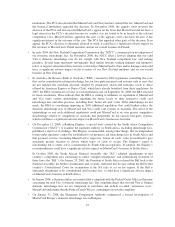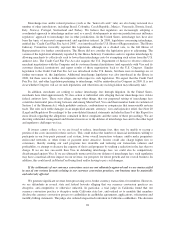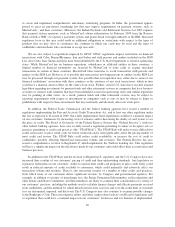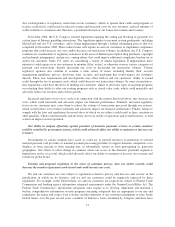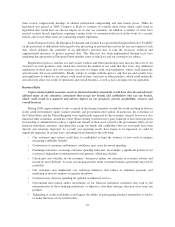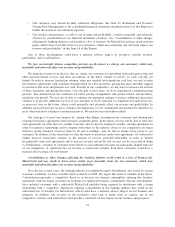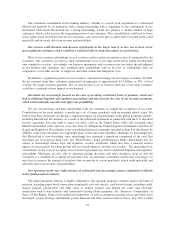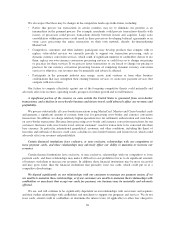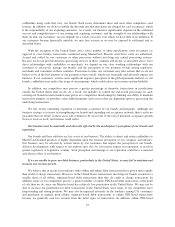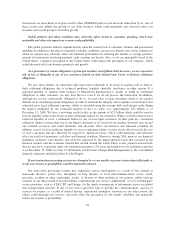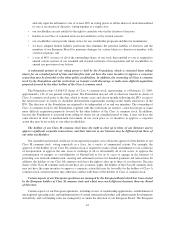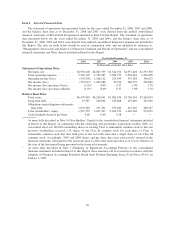MasterCard 2008 Annual Report Download - page 46
Download and view the complete annual report
Please find page 46 of the 2008 MasterCard annual report below. You can navigate through the pages in the report by either clicking on the pages listed below, or by using the keyword search tool below to find specific information within the annual report.We also expect that there may be changes in the competitive landscape in the future, including:
• Parties that process our transactions in certain countries may try to eliminate our position as an
intermediary in the payment process. For example, merchants could process transactions directly with
issuers, or processors could process transactions directly between issuers and acquirers. Large scale
consolidation within processors could result in these processors developing bilateral agreements or in
some cases processing the entire transaction on their own network, thereby dis-intermediating
MasterCard.
• Competitors, customers and other industry participants may develop products that compete with or
replace value-added services we currently provide to support our transaction processing, such as
dynamic currency conversion services, which could, if significant numbers of cardholders choose to use
them, replace our own currency conversion processing services or could force us to change our pricing
or practices for these services. If we process fewer transactions or are forced to change our pricing or
practices for our currency conversion processing because of competing dynamic currency conversion
services or otherwise, our revenues may be materially and adversely affected.
• Participants in the payments industry may merge, create joint ventures or form other business
combinations that may strengthen their existing business services or create new payment services that
compete with our services.
Our failure to compete effectively against any of the foregoing competitive threats could materially and
adversely affect our revenues, operating results, prospects for future growth and overall business.
A significant portion of the revenue we earn outside the United States is generated from cross-border
transactions, and a decline in cross-border business and leisure travel could adversely affect our revenues and
profitability.
We process substantially all cross-border transactions using MasterCard, Maestro and Cirrus-branded cards
and generate a significant amount of revenue from fees for processing cross-border and currency conversion
transactions. In addition, we charge relatively higher operations fees for settlement, authorization and switch fees
on cross-border transactions. Revenue from processing cross-border and currency conversion transactions for our
customers fluctuates with cross border travel and our customers’ need for transactions to be converted into their
base currency. In particular, international geopolitical, economic and other conditions, including the threat of
terrorism and outbreak of diseases could cause a decline in cross-border business and leisure travel, which could
adversely affect our revenues and profitability.
Certain financial institutions have exclusive, or near exclusive, relationships with our competitors to
issue payment cards, and these relationships may adversely affect our ability to maintain or increase our
revenues.
Certain financial institutions have exclusive, or near exclusive, relationships with our competitors to issue
payment cards, and these relationships may make it difficult or cost-prohibitive for us to do significant amounts
of business with them to increase our revenues. In addition, these financial institutions may be more successful
and may grow faster than the financial institutions that primarily issue our cards, which could put us at a
competitive disadvantage.
We depend significantly on our relationships with our customers to manage our payment system. If we
are unable to maintain those relationships, or if our customers are unable to maintain their relationships with
cardholders or merchants that accept our cards for payment, our business may be materially and adversely
affected.
We are, and will continue to be, significantly dependent on our relationships with our issuers and acquirers
and their further relationships with cardholders and merchants to support our programs and services. We do not
issue cards, extend credit to cardholders or determine the interest rates (if applicable) or other fees charged to
36



